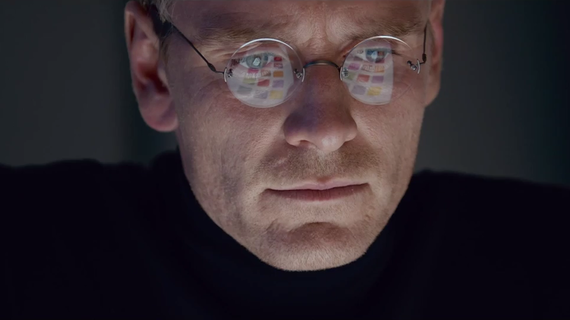Sitting in the audience, a large number of the creative individuals involved in the making of the Steve Jobs film were lined up at the front of the theater. They were there to do a Q&A session with members of the Producers Guild, a gathering of professional filmmakers. Screenwriter Aaron Sorkin was on stage, along with director Danny Boyle, and actors Seth Rogen, Kate Winslet, Jeff Daniels, and Michael Stuhlbarg. Only Michael Fassbender wasn't in attendance.
The interviewer, from Esquire Magazine, asked a seemly innocent question: "Had anyone on stage ever met Steve Jobs?" Only Sorkin responded, saying he'd had three phone calls with him. One, to compliment a film he'd made, the second when Jobs asked him to write a Pixar movie, and the third when he reached out for help on his Stanford commencement speech. Said Sorkin: "None of those were calls where he was anything but charming."
And there's no doubt - while Danny Boyle was the director, this is very much Sorkin's film. As he explained it to the audience, before he knew what he wanted to do with Walter Isaacson's biography of Steve Jobs - he was clear about what he wasn't going to do. He didn't want to do a conventional "cradle-to-the-grave" bio pic. Sorkin pitched the studio on his concept - explaining that he had never had to 'audition' a script idea before, but didn't want to surprise the studio with a structure so different from what they were expecting. He broke the story into three acts, each 30 minutes long - shot in 'real time' - following Jobs through the three critical product launches, each scene taking place backstage; "I didn't think there was a chance the studio would let me do that" Sorkin admits, "but they did."
Here Boyle chimes in telling the audience that he always thought that Steve Jobs was the second part of a trio of films Sorkin would make about tech titans - reminding the audience that Sorkin had penned 'The Social Network' about Mark Zuckerberg and Facebook. Here Sorkin is coy - calling the two films a 'coincidence'. Ironic since in the Jobs film, Jobs tells his estranged daughter Lisa that his computer called "Lisa" was a coincidence. It wasn't. And neither was Sorkin's second take on integrating the power and complexity of tech in our society.
And that's the problem with the film. The demands of a major motion picture and its limitations may be too conventional and narrow a box for the complex and world-changing Jobs.
The film is organized around three "backstage" scenes. Three major product launches. Each launch being both a life changing moment for Jobs, and presumably a world changing moment for technology. The three launches were the Macintosh launch in 1984, with the powerful "1984" commercial splashed across the big screen. Then, the NeXT computer in 1988 - a beautiful cube that was little more than an excuse to re-introduce his powerful vision to the Apple board of directors. And finally the iMac in 1998, when Jobs strode on stage and launched the colorful computers that would breathe life - and a future - into Apple.
Sorkin is clear about what his screenplay is and what it isn't. "Walter's biography had to be about what happened," Sorkin told Esquire Magazine. "It had to be a piece of journalism. When I write something, there is actually a requirement to be subjective; it's really the difference between a photograph and a painting."
So Sorkin's painting is part fact, part fiction, and part an subjective analysis. Was Jobs genius driven by his adoption? That seems far too simple. Was his drive to build a 'closed system' the thing that destroyed the launch of the first generation Mac, and at the same time, set in motion an elegance and simplicity controlled by Jobs and Apple that has revolutionized the home computer and put 'a dent' in the world? That seems more likely.
Sorkin's Steve Jobs won't answer all your questions about the man. In fact, we're just starting to engage in the complexity of what he built, and the legacy he leaves behind. But Steve Wozniak saw the film, and he's not portrayed without his faults and foibles. Woz told Deadline Hollywood: "I felt like I was actually watching Steve Jobs." So, that's certainly a relevant endorsement.
As the screening ended, and the Q&A began - the cast and creative team walked on stage. And in the audience, each of us, without for a moment thinking of the irony - hold up our iPhones to take a picture. Outside, across from the AMC on 68th Street, the magnificent Apple glass cube glowed powerfully in the rainy night.
Anyone who doubts that Jobs changed the world need look no further than that.


